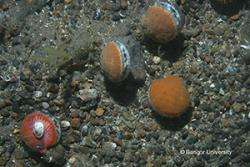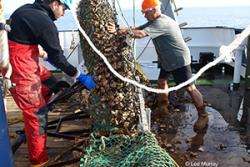World's largest ever fishing impact study brings hope for Cardigan Bay Scallop fishermen

Scientists from Bangor University, working together with the Welsh Fishermen's Association, Welsh Government and Natural Resources Wales have published their findings from the world's largest ever fishing impact study, funded in part by the European Fishery Fund.
Cardigan Bay Special Area of Conservation (SAC) was closed to scallop fishing in 2009. Research led by Bangor University has focused on understanding the amount of scallop fishing within the SAC that would be considered sustainable and that would not damage the conservation features of the area.
To do this, the team spent 18 months preparing to undertake a mammoth fishing experiment in which 12 different sites were fished at different intensities by commercial boats. The results of the fishing were compared to four areas left unfished. Having now established that the area can withstand a certain level of fishing, the next step in the work is to provide more information to further guide the agencies responsible to decide on future management measures, and if appropriate, for setting the level of fishing to be permitted.
Professor Michel Kaiser who leads the Fisheries & Conservation Science Group at Bangor University's School of Ocean Sciences said:
"This is the first study of its kind that provides information that would enable us to advise on the amount of fishing that the seabed within the SAC can tolerate, it provides the basis for a truly ecosystem based approach to management of a potential fishery in the area."
Most fisheries are managed according the target species, in this case scallops. Setting two thresholds, one for seabed disturbance and one for scallops would provide a strong incentive for fishermen to disturb as little of the seabed as possible.

Dr Gwladys Lambert who led the research said: "We learnt a huge amount from this study and we know that Cardigan Bay is very resilient to scallop dredging but we now know precisely how much fishing can be considered to be sustainable. None of this would have been possible without the collaboration of the fishing industry and processors who worked incredibly hard to help us achieve this unique piece of science."
More information: The reports are available online: fisheries-conservation.bangor. … id=10722&subid=10805
Provided by Bangor University





















